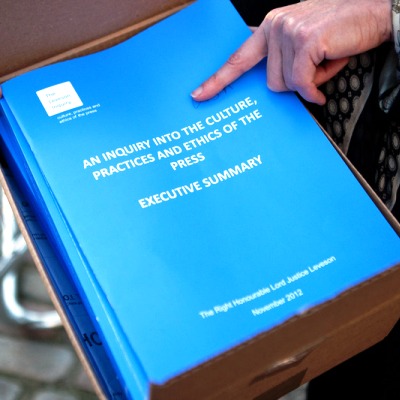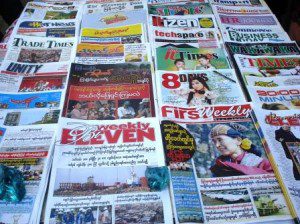IPSO proposal an opportunity to break Leveson deadlock
 The industry’s proposal for a new press regulator is not perfect. But it’s a starting point for proper discussion on the future of Britain’s free press, says Padraig Reidy
The industry’s proposal for a new press regulator is not perfect. But it’s a starting point for proper discussion on the future of Britain’s free press, says Padraig Reidy
(more…)
 The industry’s proposal for a new press regulator is not perfect. But it’s a starting point for proper discussion on the future of Britain’s free press, says Padraig Reidy
The industry’s proposal for a new press regulator is not perfect. But it’s a starting point for proper discussion on the future of Britain’s free press, says Padraig Reidy
(more…)
Akhmednabi Akhmednabiev, a well-known Russian journalist who reported on human rights violations in the Caucasus, was shot dead near his house around 7am local time today. Andrei Aliaksandrau reports


The number and range of media in Burma has proliferated
Going against its own Press Council, parliamentarians in Burma have passed a restrictive new press law that will restrict freedom of the press, Mike Harris reports.
On 4 July, Burma’s lower house of parliament (Pyithu Hluttaw) passed a restrictive press law that will restrict freedom of the press and kept in place many of the most draconian elements of the existing legal framework.
The Printing and Publishing Enterprise Law, drafted by the Ministry of Information, renews the government’s power to license newspapers, news websites and foreign news agencies and has strict rules on obscenity and the incitement of public disorder. The Ministry of Information’s draft law has been viewed by members of Burma’s fledgling press council as an attempt to undercut their attempts to formulate a new press law. Burma’s Press Council was founded by the government in October 2012 with the intention that journalists, their trade unions, media owners and civil society stakeholders should develop a new press law. After a disappointing first attempt at reform, the Press Council is currently working on a second draft of its law.
In the meantime, the Ministry of Information drafted its own press law, aimed at undercutting the more open and inclusive process undertaken by the Press Council. While abolishing some of the prison sentences under the old Printing and Publishing Enterprise Law (1962), the law keeps criminal sanctions as well as excessively high fines for media organisations breaching the law.
After the publication of this law, Burma’s increasingly vocal civil society launched a public campaign to prevent the adoption. The Press Council sent letters to the president and the Speaker of Parliament setting out their objections to the proposals. It seemed that parliament was more responsive to the demands of civil society when after coordinated pressure, the Chair of Parliament’s House of Representatives Sports, Culture and Public Relations Development Committee (and Vice-Chair of the Union Solidarity and Development Party), Thura Aye Myint, said the law needed reflecting upon and it would not be debated in this session of parliament. Yet, just three months later, the law was passed by the lower house.
In response, members of the Press Council have now threatened to resign on mass. Eleven Myanmar reports that Zaw Thet Htwe, a member of the Myanmar Journalists Union (MJU), has expressed his disappointment with the bill stating:
“We opposed the press bill when it came out. Then, the minister met with the Press Council. Provisions on printing and publishing are also enshrined in the media bill drafted by the council. So we demanded those provisions be removed from the press bill. The ministry refused it and promised to amend some provisions. But it is not the same as they said when the bill was approved. We have to reconsider dealing with the ministry [altogether]”.
Burma’s upper house will now need to consider whether to pass the Ministry of Information’s restrictive law, or consider the Press Council’s proposals when they are finalised. If the Ministry of Information’s press law is passed, it will call into question how serious the government of Burma is in reforming its draconian legal landscape for freedom of expression.
INDEX EVENTS
18 July New World (Dis)Order: What do Turkey, Russia and Brazil tell us about freedom and rights?
Index, in partnership with the European Council on Foreign Relations, is holding a timely debate on the shifting world order and its impact on rights and freedoms. The event will also launch the latest issue of Index on Censorship magazine, including a special report on the multipolar world.
(More information)
FROM INDEX ON CENSORSHIP MAGAZINE
Global view: Who has freedom of expression?
Freedom of expression is a universal, fundamental human right. But who actually has access to free expression? Index CEO Kirsty Hughes looks at the evidence.
(Index on Censorship)
Global view: Who has freedom of expression?
Freedom of expression is a universal, fundamental human right. But who actually has access to free expression? Index CEO Kirsty Hughes looks at the evidence.
(Index on Censorship)
The multipolar challenge to free expression
As emerging markets command influence on the international stage, Saul Estrin and Kirsty Hughes look at the impact on economics, politics and human rights.
(Index on Censorship)
News in monochrome: Journalism in India
The media’s infatuation with a single narrative is drowning out the country’s diversity, giving way to sensationalist reporting and “paid for” news. But, says Bharat Bhushan, moves towards regulation could have a chilling effect too
(Index on Censorship)
Censorship: The problem child of Burma’s dictatorship
Writer and artist Htoo Lyin Myo gives his personal account of working under government censorship in Burma
(Index on Censorship)
BURMA
Burma’s Press Council Threatens Resignation Over Media Rules
Members of Burma’s interim Press Council say they will resign if the newly minted Printing and Publishing Enterprise Bill is passed into law in its current guise.
(The Irrawaddy)
CHINA
State of the artist in China
“What can they do to me?” asks Ai Weiwei. “Who is afraid of Ai Weiwei?” sprays a young woman on city buildings in Hong Kong. You can hate him or love him but you can’t ignore Ai Weiwei.
(The Hindu)
GLOBAL
All the ways Google is asked to censor the web, in one handy chart
Google recently released statistics on all the legal requests it gets to censor the Web via its many services, from Search to YouTube. Now Sebastian Sadowski has created some handy visualizations of all the ways information is being censored — perhaps without you even realizing it.
(io9)
INDIA
To free the press or not to: the Indira govt debate?
The Indira Gandhi government feared Emergency and its various aspects, including the controversial family planning programme, would see the government “severely criticised” if press censorship was lifted in the run-up to the March 1977 Lok Sabha elections.
(Indian Express)
‘India has a strong culture for cinema’
Cinema is a movement that lets you enter the personal space of subjects without disturbing them and the art lies in then knitting a story around them, acclaimed French filmmaker Claire Denis said on Monday while addressing a news conference at the Film and Television Institute of India (FTII).
(Times of India)
IRAN
Iran’s Rouhani Set to Revamp Censorship?
Iranian President-elect Hassan Rouhani may be set to revamp the country’s censorship, according to a speech he delivered in Tehran.
(Israel National News)
MOROCCO
Free speech sidelined in Morocco
Despite promising reform and introducing a new constitution in 2011, Morocco’s treatment of dissidents indicates the changes were just window dressing, Samia Errazzouki writes
(Index on Censorship)
NEW ZEALAND
Critic claims censorship on Collins Wiki
Justice Minister Judith Collins’ office has become embroiled in a Wikipedia war with ministry critic Roger Brooking. Brooking is an outspoken critic of Collins and the Justice Ministry and was a prolific Wikipedia editor – now banned – under the username Offender9000.
(Southland Times)
RUSSIA
Guest Post: International solidarity with Russian civil society is crucial
Global action is needed to counter Putin’s crackdown on civil society, says Yuri Dzhibladze, president of the Center for the Development of Democracy and Human Rights
(Index on Censorship)
Russia to Develop ‘Code of Ethics’ for Film Industry
Veteran Russian directors Karen Shakhnazarov and Marlen Khutsiyev have been included in a working group charged with developing a code of ethics for the Russian film industry, an idea originally suggested by President Vladimir Putin.
(The Hollywood Reporter)
SINGAPORE
US ‘deeply concerned’ by Singapore Internet rules
The United States said Monday it was “deeply concerned” by what it called a “new restrictive” law in Singapore for licensing online news websites.
(Inquirer)
TUNISIA
Hollande’s Tunisia Visit Upsets
Some Civil Society Advocates
While many observers expected the visit of French President Francois Hollande to Tunisia to be postponed, others believed that its timing was counterproductive in the sense that it signaled indirect support for the ruling troika.
(Al Monitor)
UNITED STATES
Top Attorney Floyd Abrams Has Defended Free Speech For Over 40 Years
Floyd Abrams is an ardent defender of free speech and a passionate proponent of the First Amendment. Except for the time that his 12-year-old daughter, now a federal judge, told her dad that she and some friends were going to an R-rated movie.
(NY1)
Coalition calls for veto of NJ media violence ‘disinformation bill’
The National Coalition Against Censorship, American Booksellers Foundation for Free Expression and the Center for Democracy and Technology sent a letter to New Jersey Governor Chris Christie today asking him to veto Senate Bill 2715, which would require the state’s Department of Education “to prepare and distribute informational pamphlets on how parents can limit a child’s exposure to media violence,” which includes video games, according to the text of the bill.
(Polygon)
Previous Free Expression in the News posts
July 8 | July 5 | July 4 | July 3 | July 2 | July 1 | June 28 | June 27 | June 26 | June 25